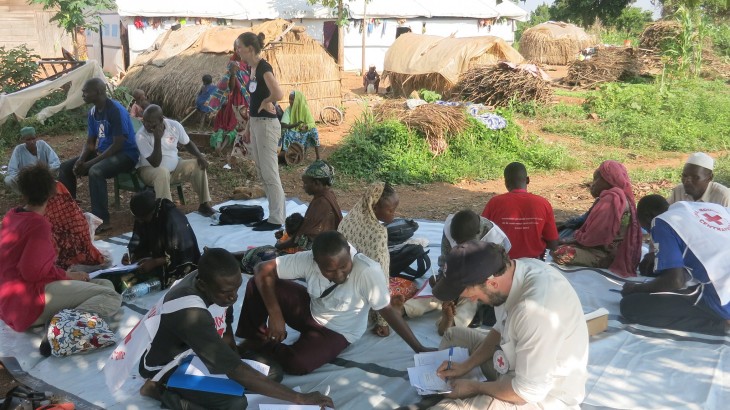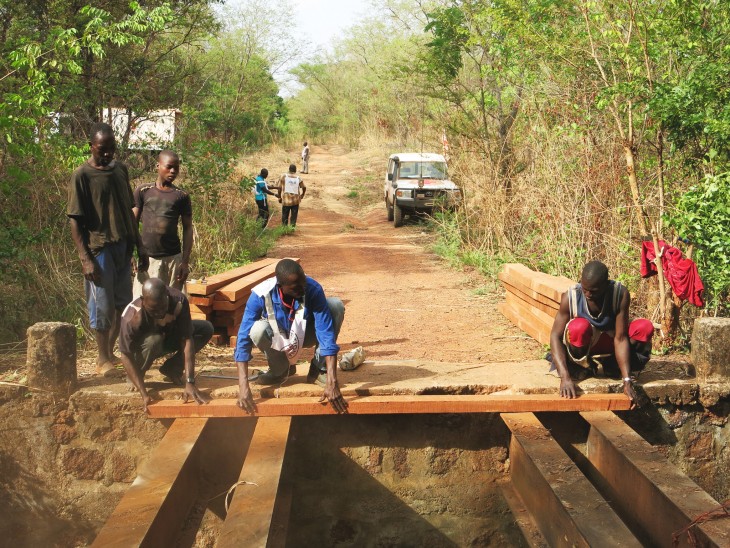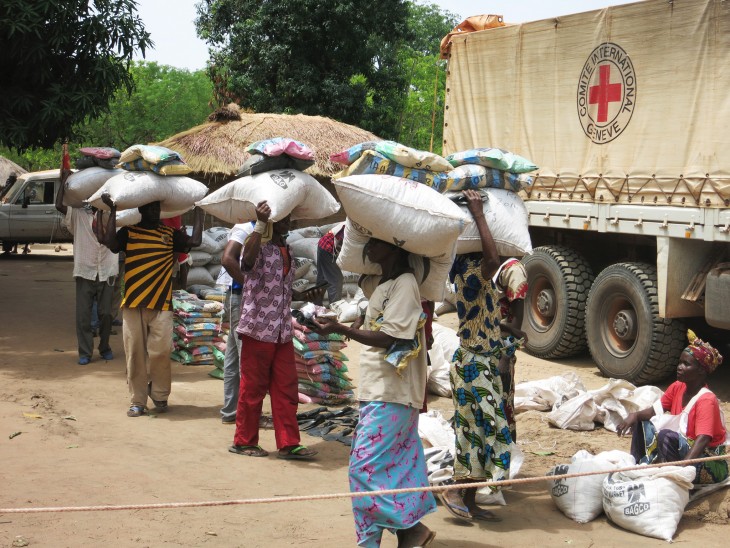
ICRC staff and Central African Red Cross volunteers work together to register the tracing requests of people separated from their families as a result of the conflict. ICRC
One of the tragic consequences of the armed conflict in the west of the Central African Republic is that families have become separated and dispersed as they fled. When they weren't trapped in their villages or neighbourhoods, thousands of people sought refuge from the violence in neighbouring countries or camps for people displaced within the country. Many of them – adults and children alike – have no news of their loved ones.
"In this part of the country, very few families have been spared the pain and uncertainty of being separated from loved ones," said Scott Doucet, head of the ICRC sub-delegation for the west of the country. "For many children, all they want is to be reunited with their parents as soon as possible." The regions worst affected are Ouham, Ouham-Pendé, Nana-Mambéré and Mambéré-Kadeï, and the towns of Yaloké, Carnot, Berberati and Boda.

An ICRC team repairs a bridge linking Markounda to the neighbouring village so that aid can be delivered. CC BY-NC-ND/ICRC/Elena Aranz Aranz
Despite logistical and security challenges, ICRC and Central African Red Cross teams, as well as staff from the Red Cross Societies in the neighbouring countries, are doing their utmost to trace the relatives reported missing and put family members back in touch wherever possible.
In the past year, they have managed to trace 350 people, collected over 250 Red Cross messages and delivered another 150, and enabled over 200 phone calls to be made between separated family members. Their efforts also resulted in 16 people being reunited with their families.
But in spite of these positive results, over a thousand people are still without news of their loved ones. "You can see the anguish on their faces," said Scott Doucet. "And then the immense relief when they read a Red Cross message written by their loved one or hear the voice on the phone of someone they feared dead."
To improve their skills in this field of restoring family links, 12 volunteers from the Central African Red Cross who work in Boda and the surrounding area attended an ICRC training course at the end of May.
But missing loved ones is not the only ordeal endured by communities in the west of the Central African Republic. They face a daily struggle to find drinking water, food and other essential supplies, shelter, basic health care, education for their children, and seed and tools to farm the land. These people desperately need the authorities and the humanitarian community to step up their relief efforts.

The ICRC distributes seed and farming tools to people in Markounda. CC BY-NC-ND/ICRC/René Claude Gonoporo
In April and May 2015, working throughout the country, the ICRC and the Central African Red Cross together:
- performed over 200 operations, conducted 940 emergency medical consultations at Bangui community hospital, and admitted 480 people to Bangui and Kaga Bandoro hospitals;
- carried out 4,530 curative consultations and 680 prenatal consultations, administered 310 vaccinations to children aged 12 and under and women of childbearing age in the health centres in Dissikou and Ouandago (Nana-Grébizi prefecture), and referred 30 patients to Kaga Bandoro regional hospital;
- treated 920 malaria patients in Birao and trained 30 motorcycle taxi drivers to perform life-saving first aid;
- reunited 13 children with their families, 11 of whom were repatriated from Chad;
- distributed vegetable and crop seed and farming tools to 10,000 families returning home and over 300 resident families in the prefectures of Ouham, Ouaka and Nana-Grébizi, as well as half-monthly food rations to over 2,500 displaced people travelling between Bambari and Ippy, in Ouaka prefecture;
- delivered clean water to over 15,000 displaced people living in a makeshift camp at Bangui-Mpoko airport, and secured the daily drinking water supply for 10,000 local residents, 10,000 displaced people and the hospital in Ndélé, Bambari university hospital and 18,000 displaced people in Kaga Bandoro;
- built 30 latrines on two sites where displaced people are living, and ran hygiene-awareness sessions for 15,000 displaced people in Kaga Bandoro;
- provided the national water board (SODECA) with 90 tonnes of aluminium sulphate, 15 tonnes of calcium hypochlorite and 6 tonnes of slaked lime to treat Bangui's water supply;
- ran awareness-raising sessions about Red Cross work for 450 schoolchildren in Bangui and 80 officials, community leaders and civil society representatives in Birao;
- ran awareness-raising sessions about the fundamentals of international humanitarian law for a hundred fighters in Kaga Bandoro and Moyenne Sido;
- taught 150 members of the Central African armed forces about the fundamentals of international humanitarian law;

No comments:
Post a Comment